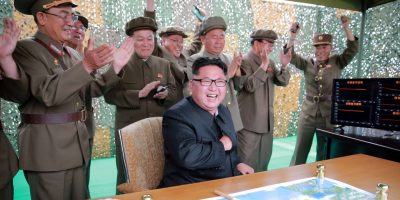Physicians’ Prescription for Action on North Korea. Promote Diplomacy, Prevent War
Congress must recognize the risk of a massive public health disaster and block the path to war

In the run-up to the June 12 summit with North Korea, a group of prominent physicians today urged Congressional leaders to promote diplomacy and prevent a war that could result in massive casualties. In a sign-on letter organized by Physicians for Social Responsibility and delivered today to key committee chairs and majority and minority leaders in both houses of Congress, the physicians warned about the catastrophic impact of a war on the Korean Peninsula. In the letter, the physicians “welcome the recent diplomatic momentum” but also demand that if diplomacy fails,“as a matter of public health policy…Congress must act to block the path to war.”
“Twenty-five million people on both sides of the Korean demilitarized zone, including at least 100,000 American citizens, are at risk,” the letter said. “In its November, 2017, report: The North Korean Nuclear Challenge: Military Options and Issues for Congress, the Congressional Research Service estimated that any military conflict on the Korean Peninsula would cause mass civilian casualties. And the medical consequences of any use of nuclear weapons would be catastrophic, with no adequate medical response…. It is critical that Congress re-assert its war-making authority, require Congressional approval for any military strike against North Korea, and actively support diplomacy in the region.”
The full text of the letter and list of signers is posted here.
The physicians’ concerns are well founded. Several officials have made statements concurring with the Congressional Research Service report’s finding that if the U.S.goes to war with North Korea, mass casualties are likely. Defense Secretary Mattis said it “would be probably the worst kind of fighting in most people’s lifetimes.”
“We are deeply concerned about the possibility of a war in Korea which would be a humanitarian catastrophe,” said Ira Helfand, MD, one of the signers of the letter. “The summit can be an important step toward denuclearization, but it is just the beginning of a process. If the summit does not go well—and there is a good possibility that it will not—we cannot use this ‘failure’ as a pretext to go to war.”
Dr. Helfand is co-chair of PSR’s Nuclear Weapons Abolition Committee, and co-president of the global federation International Physicians for the Prevention of Nuclear War (IPPNW). PSR is the U.S. affiliate of IPPNW.
If North Korea does not readily abandon its nuclear weapons, the physicians argue it’s all the more critical for Congress to block the path to war to stop a predictable, preventable public health disaster. That position aligns with public opinion: 62% of Americans polled say the U.S. should not threaten military action against North Korea if it does not give up its nuclear weapons.
“Tracking the play-by-play interactions with North Korea, it’s too easy to forget this is not a political football game,” said Lynn Ringenberg, MD, President-elect of PSR and retired U.S. Army Colonel, who also signed the letter. “It’s not simply a matter of the U.S. prevailing and getting North Korea to do what it wants. Literally millions of lives are at stake, which it’s incumbent on policymakers to protect. If the President thinks the U.S. can ‘win’ by going to war and triggering massive casualties, then Congress must exercise its Constitutional authority over war-making to prevent it. No military strike against North Korea should be launched without Congressional approval.”
The 2018 National Defense Authorization Act that recently passed the House contains language stipulating it is not to be construed as authorizing use of force against North Korea. The Senate takes up the measure this week. Representative Ro Khanna (D-CA) introduced legislation (H.R. 4837) specifically asserting Congressional authority over an American first-strike on North Korea, with 69 cosponsors. Senators Ed Markey (C-MA) and Chris Murphy (D-CT) have introduced similar legislation in the Senate. (S. 2016 and S. 2047).
“North Korea is wrong if it thinks nuclear weapons are providing security,” said Martin Fleck, Director of PSR’s Nuclear Weapons Abolition Program. “But the same is true for all of the nuclear-armed countries. PSR advocates for the total elimination of nuclear weapons worldwide, and we strongly support the Treaty on the Prohibition of Nuclear Weapons. ‘Denuclearizing’ the Korean Peninsula is imperative to protect public health and safety, and physicians and health professionals recognize that imperative. But we should also recognize we can’t ultimately protect health and safety without global denuclearization.”

